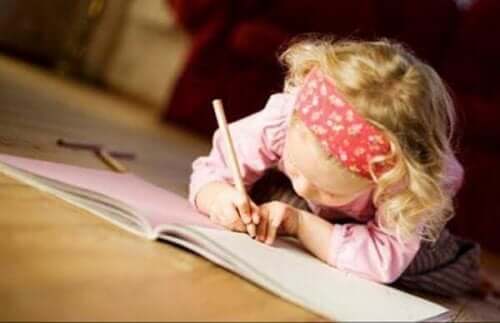5 Important Moments in a Child's Development

It’s not uncommon for new mothers and fathers to ask themselves when their baby will start crawling, walking, talking, etc. That’s why we want to take this opportunity to talk about some of the most important moments in a child’s development.
However, don’t worry too much about the precise age in which your own little ones accomplish these skills. Remember that every child has his or her own rhythm when it comes to learning and developing.
What are the most important moments in a child’s development?
The most important moments in a child’s developmental process occur fundamentally in four areas. As little ones grow, they’ll gradually progress in each of the following areas:
- Physical and psychomotor development.
- Cognitive development.
- Social affective development.
- Language development.
“Child development is an active process that’s unique for each child, expressed by continuity and changes in motor, cognitive, psychosocial, and language abilities, with increasingly complex acquisitions in the functions of daily life and the exercising of their social role.”
– J. M. D. Souza –
5 important moments in a child’s development
A child’s first steps
As for the psychomotor area of development, one of the most important moments is when children take their first steps. This is a moment that parents remember with a great deal of excitement and tenderness.

On average, children learn to walk on their own between the ages of 14 and 18 months. From this point on, little ones are able to move about with more autonomy. As time goes on, they’ll continue to acquire more abilities when it comes to gross motor skills. Soon, you’ll see your little one running, jumping, and going up and down stairs.
A child’s first words
Every mother and father look forward to the day when their child says his or her first word. And that brings us to our second important moment in a child’s development.
Spain’s National Institute of Deafness and Other Communication Disorders (N.I.D.C.D.) affirms that children usually pronounce their first word between the ages of 7 and 12 months. From this point on, little ones expand their vocabulary little by little. They begin by learning words like mama, dada, water, no, yes, bye-bye, ball, etc. Of course, they’re likely to have a unique pronunciation when it comes to certain words.
By the time children are between the ages of 18 and 23 months, they have a vocabulary of approximately 50 words. And between the ages of 2 and 3, they’re ready to construct simple phrases. So, before you know it, you’ll be able to hold entire conversations with your little one.
Sphincter control
Between the ages of 12 and 18 months, children begin to become aware of their need to poop and pee. Before this point, they’ve already discovered how they feel after pooping or peeing in their diapers. Now, they start to understand and relate the signs their bodies give them beforehand. Normally, children start to let their parents know when they’re about to go to the bathroom or need a diaper change.
By the time they’re 2 or 3 years old, on average, children learn to contract and relax their pelvic muscles. Therefore, they’re able to control their sphincters during the day. Then, gradually and over time, they stop having accidents during the night and start going to the bathroom on their own. And when that happens, you can finally say goodbye to diapers!
The first time your child reads
In order to acquire the ability to read, first children must develop phonological awareness. In other words, they must obtain the ability to comprehend that words are made up of sounds. Once they’ve surpassed this stage, they’re ready to learn to read.
Children tend to begin to put phonemes together and read a few words by the time they’re 5 or 6. Around this time, you’ll notice your child showing more interest in the writing that books and stories contain… and not just the pictures that appear on their pages. In no time at all, he or she will be reading. This is no doubt an unforgettable moment in a child’s development.
The first time your child writes
The first thing that children usually learn to write is their own name. This usually occurs when they’re already in school since this is where they learn to read and write.
In this sense, it’s important to keep in mind that developing the ability to write requires certain graphic skills. Therefore, it’s between the ages of 5 ad 6 that children usually acquire this ability.

However, it’s not until children are between 8 and 10 years old that they develop the motor precision needed for good handwriting. What’s more, you’ll notice that children continue to improve in this area throughout their school years. Little by little, their handwriting will become clearer, more organized, and more personalized.
The excitement of witnessing important moments in a child’s development
If you witness the moments we just described above, we assure you they’re something you’ll never forget. These are times that will remain in the deepest parts of your memory. And when you recall them and ponder them, they’ll be sure to bring a smile to your face. Remembering these important moments in our children’s lives will forever fill us with happiness.
As a mother or father, if you see your child reach these milestones, you’ll experience a sense of pride and excitement. Each one of these developmental accomplishments signifies a major change in our children’s lives. In these moments, we need to be close to our little ones to help them overcome the new experiences that each developmental stage involves.
It’s not uncommon for new mothers and fathers to ask themselves when their baby will start crawling, walking, talking, etc. That’s why we want to take this opportunity to talk about some of the most important moments in a child’s development.
However, don’t worry too much about the precise age in which your own little ones accomplish these skills. Remember that every child has his or her own rhythm when it comes to learning and developing.
What are the most important moments in a child’s development?
The most important moments in a child’s developmental process occur fundamentally in four areas. As little ones grow, they’ll gradually progress in each of the following areas:
- Physical and psychomotor development.
- Cognitive development.
- Social affective development.
- Language development.
“Child development is an active process that’s unique for each child, expressed by continuity and changes in motor, cognitive, psychosocial, and language abilities, with increasingly complex acquisitions in the functions of daily life and the exercising of their social role.”
– J. M. D. Souza –
5 important moments in a child’s development
A child’s first steps
As for the psychomotor area of development, one of the most important moments is when children take their first steps. This is a moment that parents remember with a great deal of excitement and tenderness.

On average, children learn to walk on their own between the ages of 14 and 18 months. From this point on, little ones are able to move about with more autonomy. As time goes on, they’ll continue to acquire more abilities when it comes to gross motor skills. Soon, you’ll see your little one running, jumping, and going up and down stairs.
A child’s first words
Every mother and father look forward to the day when their child says his or her first word. And that brings us to our second important moment in a child’s development.
Spain’s National Institute of Deafness and Other Communication Disorders (N.I.D.C.D.) affirms that children usually pronounce their first word between the ages of 7 and 12 months. From this point on, little ones expand their vocabulary little by little. They begin by learning words like mama, dada, water, no, yes, bye-bye, ball, etc. Of course, they’re likely to have a unique pronunciation when it comes to certain words.
By the time children are between the ages of 18 and 23 months, they have a vocabulary of approximately 50 words. And between the ages of 2 and 3, they’re ready to construct simple phrases. So, before you know it, you’ll be able to hold entire conversations with your little one.
Sphincter control
Between the ages of 12 and 18 months, children begin to become aware of their need to poop and pee. Before this point, they’ve already discovered how they feel after pooping or peeing in their diapers. Now, they start to understand and relate the signs their bodies give them beforehand. Normally, children start to let their parents know when they’re about to go to the bathroom or need a diaper change.
By the time they’re 2 or 3 years old, on average, children learn to contract and relax their pelvic muscles. Therefore, they’re able to control their sphincters during the day. Then, gradually and over time, they stop having accidents during the night and start going to the bathroom on their own. And when that happens, you can finally say goodbye to diapers!
The first time your child reads
In order to acquire the ability to read, first children must develop phonological awareness. In other words, they must obtain the ability to comprehend that words are made up of sounds. Once they’ve surpassed this stage, they’re ready to learn to read.
Children tend to begin to put phonemes together and read a few words by the time they’re 5 or 6. Around this time, you’ll notice your child showing more interest in the writing that books and stories contain… and not just the pictures that appear on their pages. In no time at all, he or she will be reading. This is no doubt an unforgettable moment in a child’s development.
The first time your child writes
The first thing that children usually learn to write is their own name. This usually occurs when they’re already in school since this is where they learn to read and write.
In this sense, it’s important to keep in mind that developing the ability to write requires certain graphic skills. Therefore, it’s between the ages of 5 ad 6 that children usually acquire this ability.

However, it’s not until children are between 8 and 10 years old that they develop the motor precision needed for good handwriting. What’s more, you’ll notice that children continue to improve in this area throughout their school years. Little by little, their handwriting will become clearer, more organized, and more personalized.
The excitement of witnessing important moments in a child’s development
If you witness the moments we just described above, we assure you they’re something you’ll never forget. These are times that will remain in the deepest parts of your memory. And when you recall them and ponder them, they’ll be sure to bring a smile to your face. Remembering these important moments in our children’s lives will forever fill us with happiness.
As a mother or father, if you see your child reach these milestones, you’ll experience a sense of pride and excitement. Each one of these developmental accomplishments signifies a major change in our children’s lives. In these moments, we need to be close to our little ones to help them overcome the new experiences that each developmental stage involves.
All cited sources were thoroughly reviewed by our team to ensure their quality, reliability, currency, and validity. The bibliography of this article was considered reliable and of academic or scientific accuracy.
- García Miranda, E. J. (2011). Guía del desarrollo infantil. Desde el nacimiento hasta los 6 años. Madrid: Real Patronato sobre Discapacidad.
- Marchesi,A. y Coll, C. (1991). Desarrollo Psicológico y Educación. Madrid. Alianza.
- Souza, J. M. D. (2014). Desenvolvimento infantil: análise de conceito e revisão dos diagnósticos da NANDA-I. (Tesis Doctoral). Universidadede São Paulo, São Paulo.
This text is provided for informational purposes only and does not replace consultation with a professional. If in doubt, consult your specialist.








